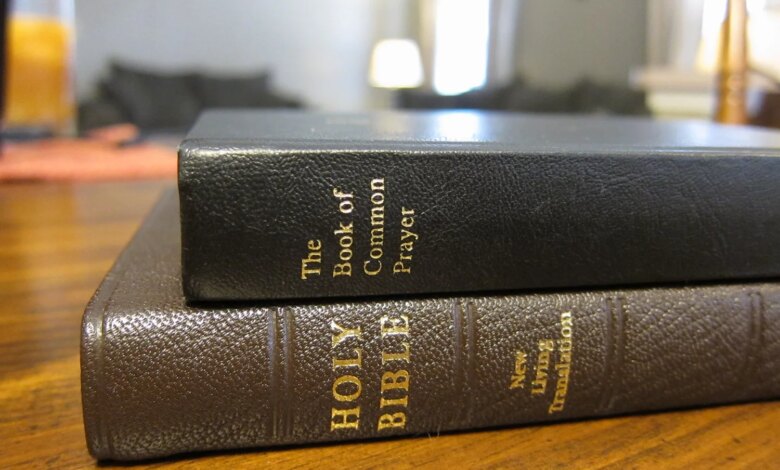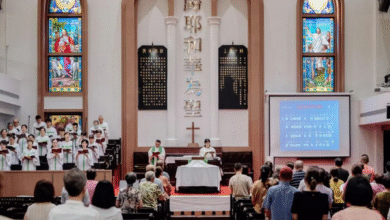In A Divided Age, Will Anglicans Ultimately Save Evangelicalism?

The conversation found its way to religion more often than you might think. That was because of Duane’s subtle influence. Those late afternoon conversations had two tangible results: Duane gave me a Book of Common Prayer and encouraged me to read it, and he challenged me to attend an Evensong Service at the Episcopal Cathedral Church in Atlanta, St. Phillips.
Evensong is the Evening Prayer service of the Anglican Communion. (The Anglican Communion is what many Anglicans call the churches, including the Episcopal Church, that make up Anglicanism.) Evensong has ancient roots, combining elements of the Roman Catholic Church’s Vespers and Compline. It includes Scripture readings, prayers (including a confession of sin) and a recitation of the Apostles’ Creed, among other elements. It typically does not include a sermon or the Eucharist. Much of the service is sung, and at a large church such as St. Phillips, that means it is sung by an outstanding choir accompanied by a magnificent pipe organ.
I now know Duane picked that service strategically: He knew it was what I needed at this stage in my life, whether I became an Anglican or not. Evensong had a beauty and grandeur that fed a hunger in me. It was a hunger the ad-hoc and pop-culture liturgies of the evangelical church could not satisfy.
So, for several months during my internship, on Sunday morning I would attend one of several large Southern Baptist megachurches in Atlanta. Occasionally, I would attend my childhood church home, Roswell Street, but more often I attended First Baptist-Atlanta, where Dr. Charles Stanley was pastor. But then, in the late afternoon, I would slide into one of the back rows at St. Philips Cathedral for the evensong service. I began to marvel at and be nourished by this rich, beautiful tradition, and also to wonder why we evangelicals had become so complacent about it.
Fast-forward five years and I am back in Athens, back at the University of Georgia, this time working on a master’s degree in English. Specifically, I sought a degree in creative writing, and the head of the creative writing department was a committed Anglican named Marion Montgomery.
It is hard to imagine a man less evangelical in the conventional understanding of that word than Montgomery. I took every class he taught during my two years in graduate school, and he would often tell me, “If you can not write, then don’t.” In other words, you should write only if your calling is so profound, so unavoidable, that you cannot do anything else.
He may have picked up that idea from Flannery O’Connor. He was especially fond of an anecdote O’Connor documents in her letters, “The Habit of Being.” At a lecture on a college campus, someone asked O’Connor if creative writing programs don’t, in fact, discourage many young writers. O’Connor replied, “If you ask me, they don’t discourage them enough.”
That O’Connor and Montgomery were like-minded was no accident. Montgomery was born in 1925, the same year as Flannery O’Connor. They both attended the legendary Iowa Writer’s Workshop, and they were friends during the last five years of O’Connor’s life. They exchanged many letters and face-to-face visits during those five years. O’Connor once wrote to Montgomery: “The Southern writer can out-write anybody in the country because he has the Bible and a little history.” That sentence has become one of the most famous — and truest — definitions of southern literature.
I was married by the time I started graduate school in the fall of 1983. My wife Missy was raised in the Lutheran Church-Missouri Synod, a church that takes both liturgy and Reformed theology seriously. But a year on the staff of the Christian ministry Young Life had altered her sensibilities, as well. Finding a church in Athens that suited us both would not be easy. However, we both knew we would not be in Athens long after I received my master’s degree, so we decided to experiment by attending the Anglican Church Marion Montgomery attended: St. Stephens Anglican Church.
At this point it makes sense to pause and say a few words (as few words as possible) about the Anglican Church in the United States.
As I have already said, for centuries the Episcopal Church has been the primary expression of Anglicanism in the United States. It was also in many ways the dominant religion, if not in numbers at least in influence. Twelve American presidents were Episcopalian. Of the first 10 presidents, five were Episcopalians. John Jay, the first chief justice of the Supreme Court and one of the founders (and later president) of the American Bible Society, was an Episcopalian.
The church was then and remains today a part of the worldwide Anglican Communion, a voluntary association of Anglican churches around the world. From its earliest days in this country, the Anglican Church was called the Episcopal Church, in part to draw a line of cultural separation from England (the American Revolution, and all that) and in part to more accurately name the kind of church it was: a church that defined itself not by its culture of origin (Anglo) but by the episcopate, or by bishops, as opposed to the two other primary forms of church governance, Presbyterian and congregational.
When the Church of England formed, many parishes simply changed the name on the door from Catholic to Church of England. In fact, the official Anglican Church history cites St. Augustine of Canterbury as the church’s founder, and the founding date as 597 A.D. The official separation from the Roman church came in 1534, and even faithful Anglicans admit this break was initially driven as much by national and political causes as theological causes.
That said, this new Church of England, or Anglican Church, while preserving much of what was true and great in the Catholic tradition, felt the need to highlight more boldly some of the doctrines of the Protestant Reformation.
This need produced various efforts by the Anglican Church to clarify its beliefs and practices. I am leaving out much instructive and interesting history when I cite only two of those efforts.
First, under the leadership of the Archbishop of Canterbury, Thomas Cranmer, the church produced a Book of Common Prayer in 1549, which it revised in 1552. The Book of Common Prayer — an ancestor of the same book Duane Riner gave me — used most of the liturgical forms of the Roman Catholic Church, but the language and theology were Reformed — highlighting the sovereignty and grace of God and diminishing the importance of human works.
Secondly, over a period of several decades, Cranmer and others created a document that eventually became “The 39 Articles of Religion,” finally ratified by the church in 1563. The document defined the beliefs of the church in language that some have come to call a via media, or “middle way” between the doctrines of the Roman Catholic Church and the Calvinistic churches that were sweeping the mainland of Europe, spreading outward from Geneva. In the words of the church itself, the Anglican Church is both “Catholic” and “Reformed.”
These words became more important to me as I grew older. The Southern Baptist church I grew up in is fond of saying that “The Church” is the Body of Christ — and not any earthly institution. The Baptists I grew up with often — and only half-jokingly — said the Catholic Church may claim Peter as its founder, but we go back even further, to John the Baptist, who baptized Jesus Himself.
But the historical facts tell a different story. The first church to intentionally identify itself as “Baptist” organized in Europe in 1609. The Baptist Church in America began under Roger Williams in 1638. If you believe that the Body of Christ is a mystical union of believers, these dates are mere curiosities. However, the Nicene Creed, that document which defines the essential beliefs of the Christian, has a line that is troubling for those of us who stand on this side of the Protestant Reformation: “We believe in one holy catholic and apostolic church.”
Let me be plain on one point: Belief in the church is not necessary for salvation. The church does not save us. The only savior is Jesus Himself, who said, “I am the way, the truth, and the life. No one comes to the father but by me.” But the early church fathers understood the propensity we have to remake Jesus in our own image. For the early church fathers to include in the Nicene Creed the necessity of believing in a “one holy catholic and apostolic church” meant they understood the importance of the church not merely as a mystical body, but also as an institutional one — that protected the peace and purity of the doctrines of the church.
So while both the Nicene Creed and the 39 Articles of Religion of the Anglican Church make it clear that Jesus is the only way to salvation, both documents also have a clear role for the “church militant,” which is — in a very real sense — the Body of Christ on earth.
These ideas became increasingly important to me as I grew older, because — as Richard Weaver said — “ideas have consequences,” and the older I got the more opportunity I had to see the negative consequences of ideas that in my youth I considered good. The post-World War II evangelical movement, a movement that spawned the megachurch and the parachurch, produced much that is good. In my line of work as a writer and leader for a Christian ministry, I meet people every day who first met God through that movement.
But I also found much in the evangelical movement that over time tended toward the heterodox and even the heretical. Because I have written an entire book about this phenomenon (“A Lover’s Quarrel with The Evangelical Church”), I will not process all of the pathologies of the evangelical church again here. I will simply say this: I came to want more than the therapeutic Jesus of the postmodern church, which is what modern evangelicalism has mostly become. I wanted a Jesus rooted in history, yes, but more than that: rooted in reality.
I do not want you to think that my own journey into Anglicanism was a completely clear-eyed exercise in logic, history, facts and reason. Circumstances and geography played a role. Missy and I value community, so we wanted to attend a church near enough our home for us to be active in that community. That meant that, at different seasons over the next 10 years we were in and out of Episcopal, Presbyterian (PCA) and Anglican churches — as we moved, or they changed. However, by the early 1990s, we were confirmed members of a conservative Episcopal church, and soon thereafter we transferred our membership to an Anglican church that was a part of the then-new but rapidly growing movement of Anglicanism in North America.
We had, after decades of search, found our church home.
If you have read this far, you can see that this story is — as I said at the outset — my story, but it is not only my story. It has been the story of many of the more than 120,000 people who have so far become a part of the Anglican Church of North America. It is the story of Sarah Carter, whose recent article we cited at the beginning, as well as thousands – perhaps tens of thousands of young people. We are people who love Jesus, and who love the Bible, but who have also come to long for more than the anemic theology and pop-culture trappings of the evangelical church.
Indeed, among my friends, I often say — only half-jokingly — that Anglicanism will save the evangelical movement. Anglicanism offers a Reformation theology tested by Scripture, an intellectual tradition tested and refined by history, and two things the modern evangelical church often lacks: beauty and mystery. Anglicanism offers an inkling of the transcendent in its elevated use of language and in its liturgies. These liturgies and language do not merely evangelize us, but deeply form us in our faith and in our very habits of being.
These benefits of Anglicanism have in recent years drawn many evangelicals. In fact, as I have reported on evangelicalism for the past 25 years, I have stopped being surprised when I discover that the leader of an evangelical ministry is Anglican. Though we currently make up far less than 1% of the American population, Anglicans are in leadership roles at many of the major Christian ministries in this country, from Christianity Today to WORLD Magazine. From The Colson Center to Compassion International. Travel to Colorado Springs, a city that has been called the “mecca of the evangelical movement” in the United States, and you will find a half-dozen thriving Anglican churches, with staff from some of the nation’s largest Christian ministries in attendance.
Or go to Wheaton College, the “evangelical Harvard,” and you will also find one of the largest Anglican churches in the country, Church of the Resurrection, within walking distance. In fact, in Sarah Carter’s article, she notes a half-dozen Anglican churches within a short drive of Wheaton.
Two of the nation’s largest evangelical seminaries, Gordon-Conwell and Reformed Theological Seminary, now have “Anglican Studies” tracks. Travel to Nashville, the home of the contemporary Christian music industry. Musicians such as Michael Card, Andrew Peterson and Sandra McCracken perform in churches of all kinds, all around the world. But when they come home, it is to an Anglican church.
That is not to say that Anglicanism does not have its problems. I recently attended the national conference for The Anglican Church in North America and wrote about what I saw and what I think needs to happen in ACNA here. The meeting took place in Latrobe, Pennsylvania. My friend and collaborator (Restoring All Things) caused a stir with his speech there on women’s ordination, an issue that remains unresolved in ACNA.
Neither has ACNA has not been immune from some of the clergy sex scandals that have rocked other denominations. And ACNA remains small.
Also, despite the denomination’s growth, large portions of the country still have no Anglican churches. It has much growing to do before it can have the sort of impact on American evangelicalism that, for example, the Presbyterian Church in America – another small denomination that “punches above its weight” – has had.
Still, Anglicanism offers something to the evangelical church that is currently missing. In the paragraphs above, I spoke of the “benefits of Anglicanism.” But that phrase is not exactly what I mean. C.S. Lewis said he was a Christian because he believed the claims of Christianity to be true. If I were forced to give a short answer to this question, I would say I belong to the Anglican Church because I believe it to be the truest, most robust expression of what the Christian church should be.
If pressed further, I would make the point that I believe the theology of the church to be sound, to be thoroughly biblical in the Reformed tradition. I would also make the point that the Anglican view of the Eucharist — Communion, the Lord’s Supper — is a very high one, and its place in the Anglican worship service strikes me as more obedient to Jesus’ admonition to “do this in remembrance of me.” Most Anglican services therefore include the Eucharist because Anglicans, like many Reformed Christians, believe that it is not merely a symbol, but a means of grace.
I should also admit that, by both temperament and training, I am an Anglophile. However, it is important to remember that most the world’s 85 million Anglicans are not English. Indeed, in the worldwide Anglican Communion, the majority ethnic group is not European, but African — a fact that, in my view, adds to the beauty of the church.
So, all these reasons are why I am an Anglican. And, if you have gotten this far, you might be asking yourself the question: Should I be an Anglican, too?
That question is, of course, between you and God.
This article was originally published at MinistryWatch.




